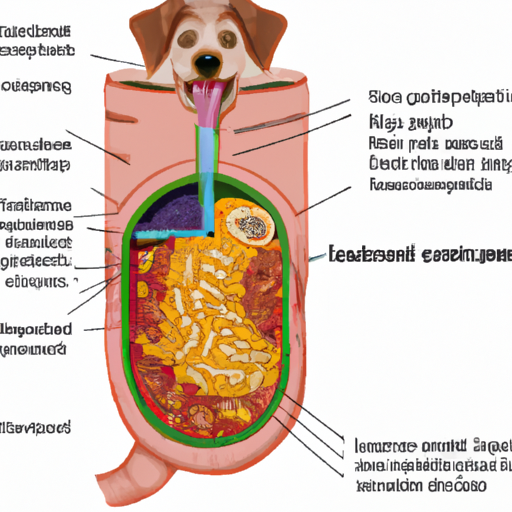As a dedicated caregiver, understanding your dog’s digestive process is crucial. You might wonder how long it takes for your furry friend to digest that kibble you just served. Let’s delve into this intriguing subject.
The Intricacies of a Dog’s Digestive System
Understanding how long food stays in a dog’s stomach starts with a basic knowledge of their digestive system. Like humans, dogs have a monogastric digestive system, meaning they have a single-chambered stomach. Here’s a simple breakdown:
-
Mouth: Your dog’s digestion kicks off as soon as they take a bite. Their teeth break down the food while salivary enzymes start working on the starches.
-
Esophagus: The chewed food then travels down a tube called the esophagus and lands in the stomach.
-
Stomach: The stomach is where the majority of the digestion occurs. Here, the food is bathed in a highly acidic gastric juice that breaks it down into a substance called chyme.
-
Small Intestine: Chyme is then moved into the small intestine, where nutrients are extracted and sent into the bloodstream.
-
Large Intestine: The remains are further dried and compacted in the large intestine before being excreted.
The Duration of Digestion in Dogs
The time it takes for food to transit through your dog’s digestive system depends on various factors. However, on average, it takes about 4 to 5 hours for food to be broken down in the stomach and another 10 to 12 hours for the food to pass through the intestinal tract. Therefore, it generally takes between 14 to 17 hours from eating to elimination.
Factors Influencing Digestion in Dogs
Several factors can influence the speed of digestion in dogs. Here are some worth considering:
- Age: Younger dogs and puppies tend to have faster metabolisms and thus digest food quicker than older dogs.
- Diet: The type and quality of food can also impact digestion. High-quality, easily digestible foods will transit quicker than low-quality foods.
- Health Status: Certain health conditions, like gastrointestinal issues, can slow down or speed up digestion.
Recognizing Digestive Issues in Dogs
As a caregiver, you should be on the lookout for signs of digestive issues in your dog, which could indicate a problem with how quickly they are processing their food. These signs may include:
- Regular vomiting
- Diarrhea or constipation
- Loss of appetite
- Lethargy
- Changes in weight
If you notice any of these signs, it’s best to consult your vet for advice.
Frequently Asked Questions
To help you better understand this topic, here are some brief FAQ’s:
1. Q: Can I speed up my dog’s digestion?
A: While you can’t significantly speed up your dog’s digestion, a healthy diet and regular exercise can promote a healthy digestive system.
2. Q: Does the size of my dog affect digestion time?
A: Generally, smaller breeds may digest their food slightly faster than larger breeds, but the difference is minimal.
3. Q: How can I tell if my dog has a digestive issue?
A: Symptoms like vomiting, diarrhea, loss of appetite, and sudden weight changes may indicate a digestive problem. Always consult your vet if you notice any unusual behaviors.
In conclusion, understanding your dog’s digestive process is key to ensuring their health and well-being. Always be observant of any changes in their eating or elimination behaviors and consult your vet if you have any concerns.



